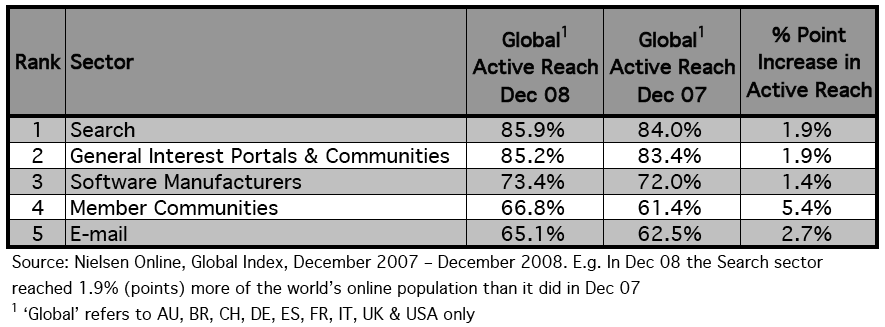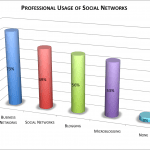Nielsen Study Shows: Social Networking More Popular Than E-Mail
E-mail has long been amongst the most popular activities online, together with searching information on the net. But according to Nielsen there is a new killer application around: social networking.

Nielsen Research Global Active Reach
A study shows, that people in the US and other countries worldwide are using social networks and blogs more often than e-mail. While searching the net remains the most popular online activity, social network and blog use exceeded that of e-mail, increasing their reach by 5.4 percentage points. As a result social network and blogging sites are now the fourth most popular activity on the Internet.
Large growth has occurred in Europe with Germany being the country with the strongest growth, coming from 39% usage rising 12 percentage points to currently 51%. But also in the UK, Spain, Italy and Switzerland is this sector reaching 10% percentage points more of the online population than it did a year ago.

Member Community Share
In addition, time spent on social networks and blogging sites is growing at over three times the rate of overall Internet growth. In total online users spent globally 18% more time in December 2008 compared to December 2007. Nonetheless, the amount of time spent on ‘Member Community’ sites rose by 63% in the same period of time. And on Facebook we have seen a massive growth of 566% – from 3.1 billion minutes to 20.5 billion! Facebook’s average using time per person (three hours 10 minutes) is the highest amongst the 75 most popular brands online worldwide.
Because time spent on social networks is growing at such a dramatically faster rate than the Internet average, it is obvious that social networks are gaining a larger share of all Internet time. In most countries monitored, the share of time for usage in ‘Member Communities’ has more than doubled.
What can advertisers and their agencies do?
The social networking phenomenon is dramatically changing the way people behave and, consequently, offers new challenges and opportunities to the global media and advertising industry alike, despite the risks this new consumer medium creates. Success in social media advertising means overcoming obstacles such as complexity, creativity and relevance.
One of the problems though is the acceptance of advertising. If you check blogs and conversations about social media “false” is the term most closely associated with advertising. And the challenge could be getting more difficult, as a Nielsen Online survey in Australia showed, because consumers are actually growing less tolerant to advertising on social media. In December 2008, 38% of Australians online considered advertising on social networking sites to be an intrusion compared to 29% the year before!
The media and advertising industry has to watch very carefully how consumers can be targeted and which strategies can be used to successfully in attract advertising revenue in 2009. The whole process will involve a substantial trial and error process (as with many other online media types) and is only achievable if social networks, advertisers and agencies work closely together.
You can get the study and more background information on Nielsen’s Online Blog.




First of all, thank you for a very relevant and interesting website.
That is a very interesting trend.
But how did they compare the use of e-mail to the use of social media in this survey? Could not have been time spent or number of uses, context, etc.
Although its interesting to read, I must say that surveys like these tend to give the impression that social media is becoming more important than for example e-mail, which i think is wrong.
I do agree that social media can or will be, much more important than the traditional channels like e-mail, but only in certain very narrow contexts, like getting customer input for a certain product, etc.
Social media has (yet) to prove that it can be a major profit driver for a business in a broad perspective.
Regards,
Michael
I intended to put you one tiny note to give many thanks the moment again relating to the incredible strategies you’ve discussed in this article. It’s strangely open-handed of you to make unhampered what exactly some people could possibly have offered for sale as an e book to get some bucks on their own, most notably since you might well have tried it if you ever considered necessary. These things also acted to become good way to know that most people have similar keenness like my very own to find out good deal more regarding this matter. I believe there are many more fun situations up front for folks who browse through your website.